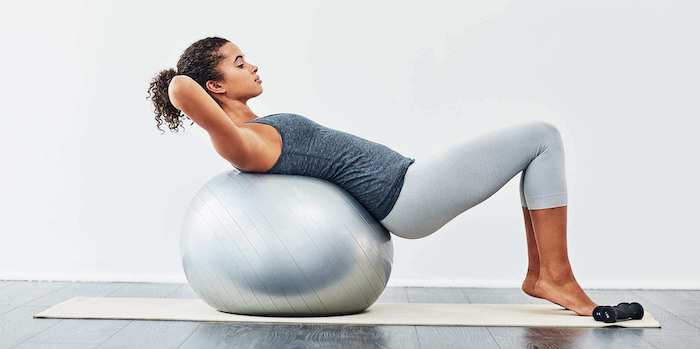
The term "Swiss ball" was coined because one of the earliest noted uses of an exercise ball was in Switzerland in 1965, where a group of physical therapists used it in their work with children with cerebral palsy. The exercise ball may also be referred to as:
- Gymnic Ball or Gym Ball
- Stability Ball
- Therapy Ball
- Physio Ball
- Blue Ball (Because Many Are Blue).
The size of exercise balls varies. Physical therapists and exercise trainers suggest using an exercise ball that fits each person's height and leg length, where the hips and knees are at or slightly greater than a 90-degree angle (thighs parallel to the ground or point down slightly) with feet flat on the floor. It is best to work with a physical therapist, exercise physiologist, or other spine specialist for a proper fit before using or purchasing an exercise ball.
The exercise ball may be inflatable and made out of vinyl plastic or solid foam rubber. Inflatable exercise balls can be punctured, so it is best to avoid wearing anything sharp (such as jewelry or a belt buckle) when using the ball. Exercise balls made of plastic can be harmed by exposure to heat or excess sunlight. Certain manufacturers claim designs that stop the exercise ball from exploding if a puncture occurs, allowing the air to leak out slowly instead.
One factor in choosing an exercise ball is its durability and ability to maintain its shape under pressure. Manufacturers should provide test load figures to the retailer for how much weight the exercise ball will hold.
Inflatable exercise balls may be sold in a deflated condition, requiring an air pump to fill them. Frequently a pump can be purchased with the exercise ball. Manufacturer instructions about air pressure and fill levels should be followed. One benefit that many people value about the exercise ball over many other types of exercise equipment is that exercise balls are portable. When traveling, a deflated ball can be placed in a suitcase and inflated upon arrival (either using one's lungs or a small hand pump).
Precision Pain Care and Rehabilitation has two convenient locations in Richmond Hill – Queens, and New Hyde Park – Long Island. Call the Queens office at (718) 215-1888 or (516) 419-4480 for the Long Island office to arrange an appointment with our Interventional Pain Management Specialist, Dr. Jeffrey Chacko.













